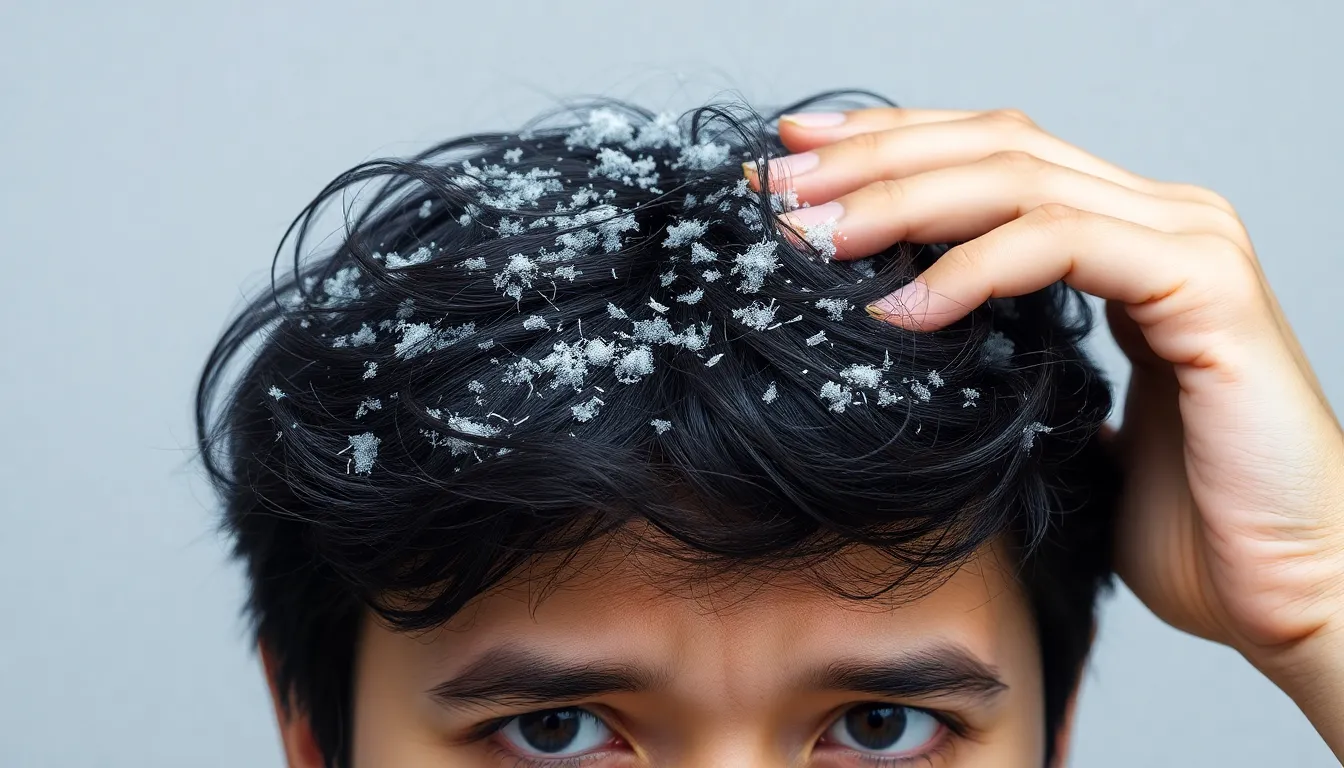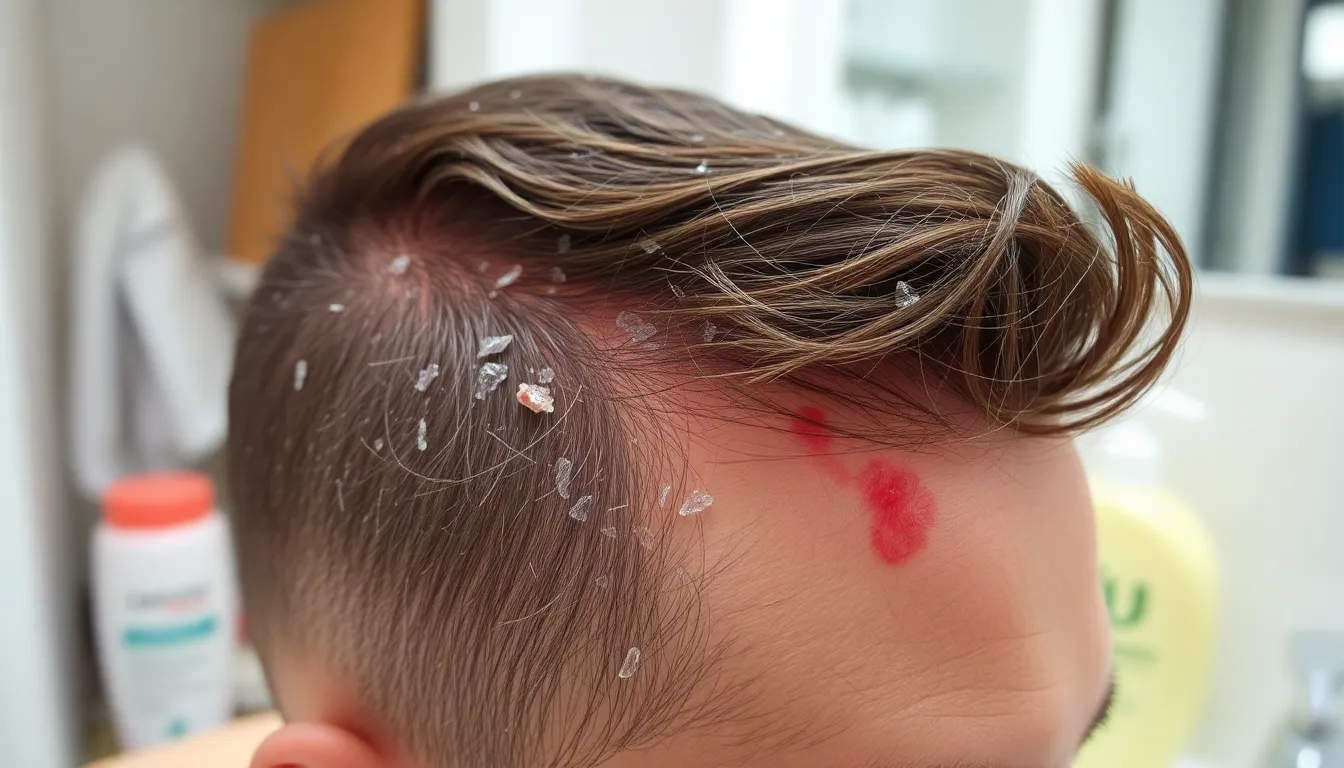Dandruff can be more than just an annoying flake issue; it can significantly impact self-esteem and comfort. Many people wonder why their dandruff seems particularly stubborn or severe, leading to frustration and confusion. Understanding the underlying causes is essential for effective treatment and relief.
Several factors can contribute to persistent dandruff, from dry skin and sensitivity to certain hair products to more complex conditions like seborrheic dermatitis. Identifying the root cause is crucial in tackling this common scalp concern. By exploring the reasons behind severe dandruff, individuals can take proactive steps toward healthier hair and a more confident appearance.
Table of Contents
ToggleUnderstanding Dandruff
Dandruff manifests as white or yellow flakes on the scalp, often accompanied by itching. Identifying its primary causes aids in finding effective treatments.
Common Causes of Dandruff
- Dry Skin: Dehydrated scalp surfaces can lead to flaking.
- Seborrheic Dermatitis: This condition causes red, flaky patches; it often includes irritated skin.
- Malassezia: This fungus thrives on oils and can contribute to dandruff by irritating the scalp.
- Sensitivity to Products: Some individuals react negatively to certain hair care items, resulting in flaking.
- Not Shampooing Enough: Infrequent cleansing allows oil and dead skin to accumulate.
Risk Factors for Severe Dandruff
- Stress: Elevated stress levels can exacerbate dandruff symptoms.
- Climate: Dry, cold air typically worsens dandruff.
- Diet: Poor nutrition may lead to an unhealthy scalp environment.
- Hormonal Changes: Fluctuations in hormones can impact scalp health.
Understanding these factors helps develop an effective strategy for managing dandruff and enhancing overall hair health.
Common Causes of Severe Dandruff


Various factors contribute to severe dandruff. Identifying these causes can help individuals address their scalp issues effectively.
Seborrheic Dermatitis
Seborrheic dermatitis presents as red, inflamed skin covered with greasy scales. It often affects the scalp but may also appear on the face and chest. This condition arises from an overproduction of oil and an inflammatory response to the fungus Malassezia. Flaking and itchiness accompany seborrheic dermatitis, making it a common cause of significant dandruff.
Dry Scalp
A dry scalp leads to small, white flakes and discomfort. Environmental factors like low humidity and harsh weather contribute to dryness. Hair products that contain alcohol or sulfates can also strip moisture, exacerbating the problem. Maintaining hydration and using gentle, moisturizing shampoos can help alleviate dry scalp conditions.
Fungal Infections
Fungal infections, particularly those caused by Malassezia, can significantly worsen dandruff. This yeast-like fungus thrives on oily areas of the scalp, leading to excessive flaking and irritation. Certain risk factors, such as a weakened immune system or hormone fluctuations, can increase susceptibility. Antifungal treatments can effectively combat these infections and reduce dandruff severity.
Lifestyle Factors Contributing to Dandruff
Lifestyle choices significantly impact dandruff severity. Several factors, like diet, stress, sleep, and hair care routines, can exacerbate this condition.
Diet and Nutrition
Diet affects skin health and dandruff. A balanced diet rich in vitamins, minerals, and healthy fats promotes scalp health. Nutrients, such as omega-3 fatty acids, zinc, and B vitamins, contribute to proper skin function. Deficiencies in these nutrients can lead to dry scalp and increased flakiness. Including foods like fish, nuts, leafy greens, and whole grains can nourish the scalp and reduce dandruff. Staying hydrated also helps maintain skin moisture and promote overall scalp health.
Stress and Sleep
Stress negatively impacts dandruff severity. Stress triggers inflammatory responses in the body, aggravating skin conditions like seborrheic dermatitis, leading to increased itching and flaking. Additionally, poor sleep disrupts the body’s regulatory mechanisms, making it harder to manage skin health effectively. Prioritizing stress management techniques, such as mindfulness, exercise, and adequate sleep, supports better skin health and may help alleviate dandruff symptoms.
Hair Care Routine
The hair care routine influences dandruff severity. Infrequent shampooing can lead to oil buildup on the scalp, worsening flaking and irritation. Using harsh shampoos or conditioners may cause sensitivity and dryness, exacerbating dandruff issues. Opting for gentle, moisturizing hair products tailored for sensitive scalps is advisable. Regular cleansing, combined with appropriate exfoliation, can help maintain scalp health and reduce the presence of flakes.
Treatment Options for Bad Dandruff
Several treatment options exist for managing severe dandruff. Both over-the-counter shampoos and home remedies can provide relief and help improve scalp health.
Over-the-Counter Shampoos
Over-the-counter shampoos usually contain active ingredients designed to control dandruff.
- Zinc Pyrithione: This antifungal agent reduces Malassezia, the yeast linked to dandruff. It’s effective in breaking down excess oil and alleviating flaking.
- Ketoconazole: A powerful antifungal that treats severe cases by targeting scalp fungi directly. It’s available in both shampoo and cream forms.
- Selenium Sulfide: This ingredient slows down the production of skin cells and has antifungal properties, helping to reduce scaling and itching.
- Coal Tar: Tar-based shampoos decrease the rate of skin cell turnover, making them effective for managing seborrheic dermatitis.
- Salicylic Acid: This helps with the exfoliation of dead skin cells but may lead to dryness. Combined with moisturizing agents, it can provide significant relief.
Choosing the right shampoo requires trial and error, as individuals may respond differently to each formulation. Regular use as directed enhances effectiveness.
Home Remedies
Home remedies offer natural alternatives for managing dandruff.
- Coconut Oil: Known for its moisturizing properties, coconut oil can soothe a dry scalp and reduce flakiness when applied before washing.
- Tea Tree Oil: This essential oil possesses antifungal properties. Dilution with a carrier oil before application can help combat dandruff effectively.
- Apple Cider Vinegar: Its acidity can help balance scalp pH, reducing yeast overgrowth. Mixing it with water and using it as a rinse may yield positive results.
- Aloe Vera: This soothing gel can calm inflammation. Direct application to the scalp may provide relief from itching and promote healing.
- Lemon Juice: Lemon’s natural acidity may deter dandruff when applied to the scalp. Rinsing it off after several minutes can help refresh the scalp.
Incorporating these remedies into a routine may lessen dandruff symptoms. Regular application, alongside proper hair care, supports overall scalp health.
When to See a Doctor
Individuals should consult a doctor if dandruff persists despite trying over-the-counter treatments for several weeks. Persistent flaking may indicate an underlying scalp condition that requires professional evaluation.
Symptoms that signal a need for medical attention include severe itching, inflamed or red scalp, and the presence of thick scales or crust on the scalp. Individuals displaying these symptoms may experience discomfort and should seek an expert diagnosis.
A healthcare provider’s evaluation can help determine if an underlying condition, such as psoriasis or eczema, contributes to dandruff severity. Chronic conditions often need prescription treatments or specialized care for effective management.
Individuals with compromised immune systems or other comorbidities should prioritize seeing a doctor for persistent dandruff. An expert can provide tailored recommendations to manage symptoms effectively while addressing any overarching health concerns.









